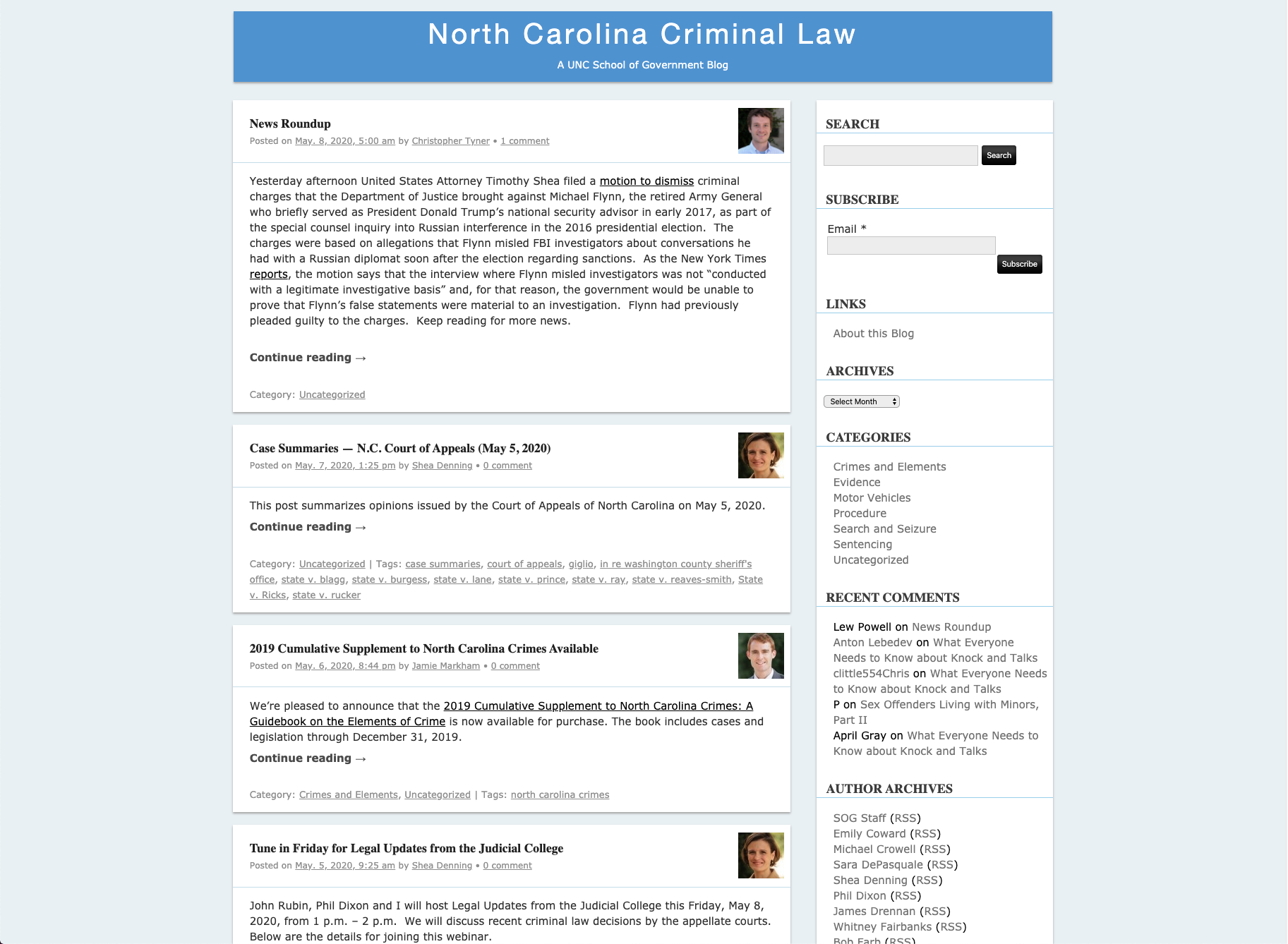You are here
Adult Protection Resources
Because the funding for this website originally focused on older adults, that is where the work on many of these resources began. Over time, we have expanded the resources and tools available through the Adult Protection Network to address concerns facing other adult populations as well. Although some of these resources are focused on older adults, they should be useful for officials who work with all adults in need of protection, including disabled adults and incompetent adults.
Manual
Manual: Legal Framework for North Carolina’s Elder Protection System
This manual, the Legal Framework for North Carolina’s Elder Protection System (Legal Framework), is intended to serve as the foundation for the online Elder Protection Network. One of the key challenges we identified in our preliminary research was that the components of the system understood their own roles within the system, but they did not necessarily understand the roles that others played. Each chapter provides a relatively high-level overview of one component.
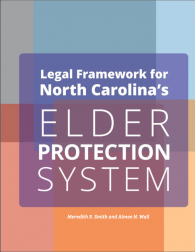
MDT Tools
Worksheets and other materials to help support the creation and operation of a multidisciplinary team.
What Do We Want Our MDT to Be? Worksheet
A worksheet for multidisciplinary teams to use to develop mission and vision statements, to set goals, and to plan next steps.
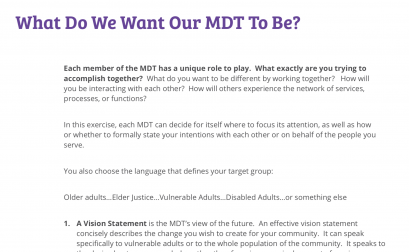
MDT Self-Assessment
A worksheet for multidisciplinary teams to use to assess collaborative efforts and to identify community needs and stakeholder limitations.
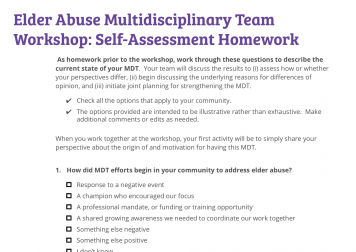
MDT Initial Planning Worksheet
A worksheet to assist professionals interested in creating or growing a multidisciplinary team with initial planning for the MDT.
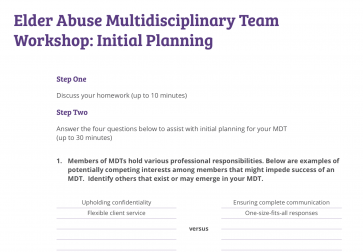
MDT Information-Sharing
A list of ten things to remember about information-sharing when participating on a multidisciplinary team.
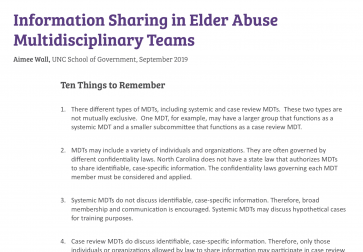
Public Management Bulletin #23 - Multi-Disciplinary Teams
Many local actors, in both the public and private sectors, are continuously doing their best to protect and help older adults, while working within a fragmented elder protection system in North Carolina. Sustaining ongoing communication and coordination among themselves and with the relevant population is challenging for these local actors, including social services agencies, law enforcement officials, financial institutions, the judicial system, health-care providers, and private nonprofits.
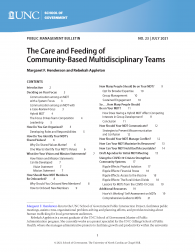
MDT Menu of Support
We know the work you are doing in the field is critical for our communities, and we want to do our part to enable your success. Listed below are resources available from the UNC School of Government and other organizations to support your work toward establishing and maintaining strong adult protection multidisciplinary teams.
Potential MDT Members
Consult this list for ideas about who you might invite to attend your MDT meeting. When considering team membership, think about the kinds of expertise, access, procedural knowledge, or logistical support needed to strengthen your team.
Empowering Faith Communities: Joining Forces with Adult Protection Multidisciplinary Teams (MDTs)
This document explores some of the benefits of involving faith communities in adult protection multdisciplinary teams (MDTs). Integrating faith communities into MDTs can enhance the team's effectivness, broaden the reach of support services, and ensure the unique needs and cultural sensitivies of vulnerable adults are considered and respected.
Sample MDT Meeting Agenda
A sample meeting agenda for adult protection multidisciplinary teams.
Sample MDT Meeting PowerPoint
A sample adult protection multidisciplinary team PowerPoint presentation.
MDT Meeting Ice Breakers
Sample ice breakers and discussion questions to use at MDT meetings.
Which State Agencies Have Resources that Might Support an Adult Protection Multidisciplinary Team's Work?
A list of state agencies within North Carolina available to support the work of adult protection multidisciplinary teams.
Quick References
Shorter legal summaries designed to synthesize more complex concepts described in the manual.
Quick Reference: Information-Sharing in Elder Abuse Cases
A summary of key confidentiality laws that apply when different components of the elder protection system want to share information with one another.
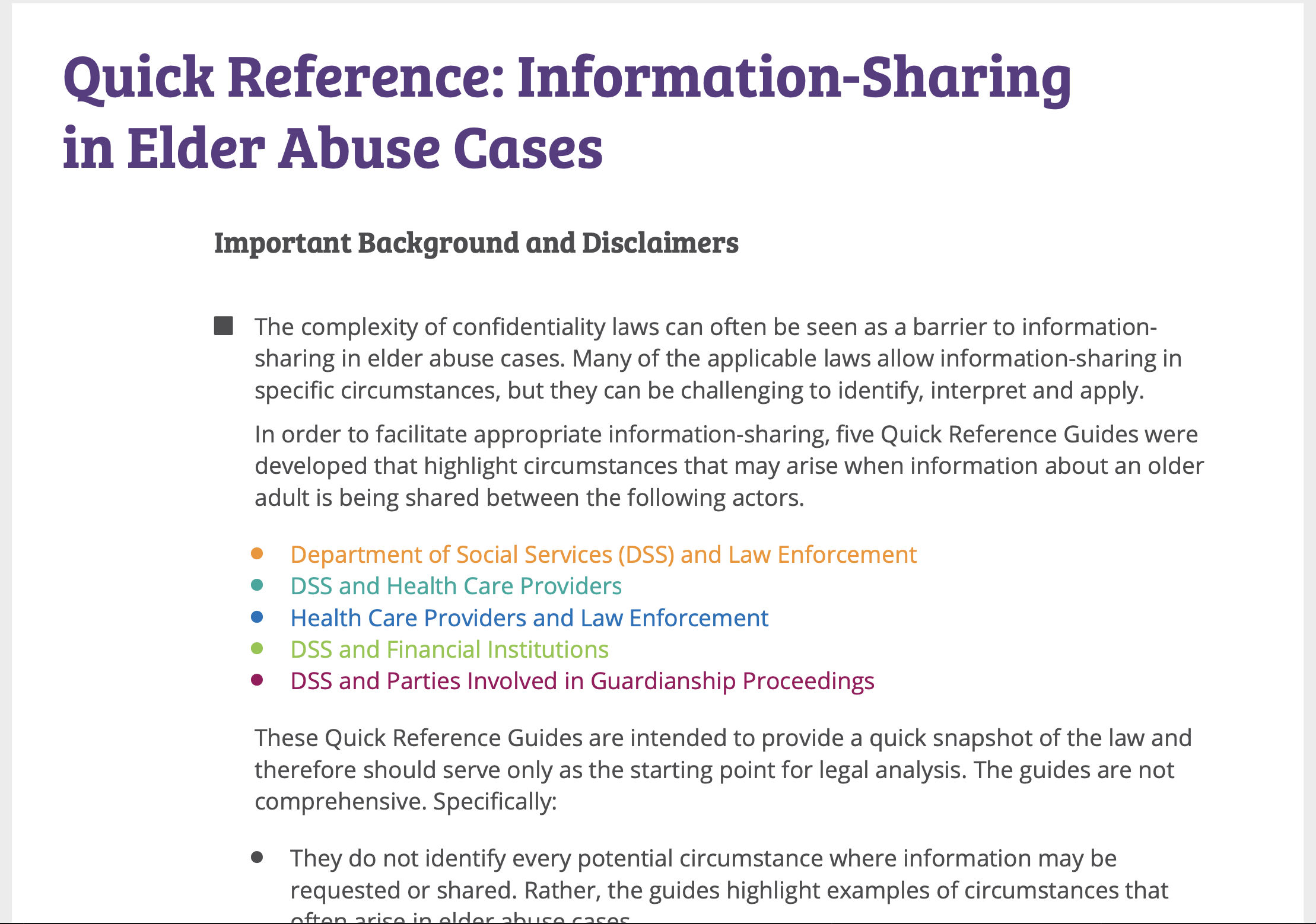
Quick Reference: Legal Framework for the Role of Financial Institutions in Elder Protection
A summary of key laws that govern the role of North Carolina financial institutions in reporting exploitation, sharing information with other components of the elder protection system, and freezing assets of older adults and criminal defendants.
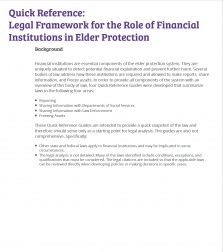
Quick Reference: Reporting Elder Abuse
A summary overview of several laws that require reporting related to suspected abuse, neglect, and exploitation of older adults, including more detailed information regarding specific reporting requirements applicable to employees and volunteers in mental health, developmental disability, and substance abuse facilities. The guide also includes contact phone numbers for all 100 county social services agencies.
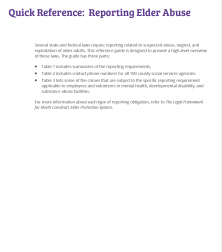
Quick Reference: Alternatives to Guardianship
A brief overview of legal and practical alternatives to guardianship of the person and of the estate that empower surrogate decision makers to act on an older adult’s behalf.
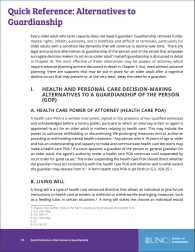
Quick Reference: Examples of Private Civil Actions Related to Elder Abuse
Case studies excerpted from The Legal Framework (Chapter 6) intended to illustrate some of the potential civil actions an older adult or the adult’s representative may consider pursuing in situations involving elder abuse.
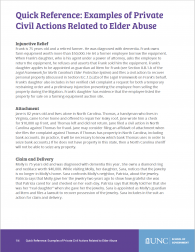
Access to Records in Financial Exploitation Investigations
Explore this quick reference guide for information regarding access to financial records in exploitation cases. The guide provides information on the tools available to investigators to access needed records, including search warrants, freeze and inspect orders, and subpoenas.
Reference Lists
Area Agencies on Aging
Contact information for the regional agencies that provide support services for older adults in their communities and also house the long-term care ombudsman program.
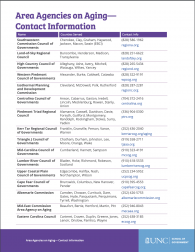
Comparing N.C. Laws on Residents’ Bill of Rights
Comparison of the state laws that specify a “bill of rights” for residents in adult care homes and nursing homes.
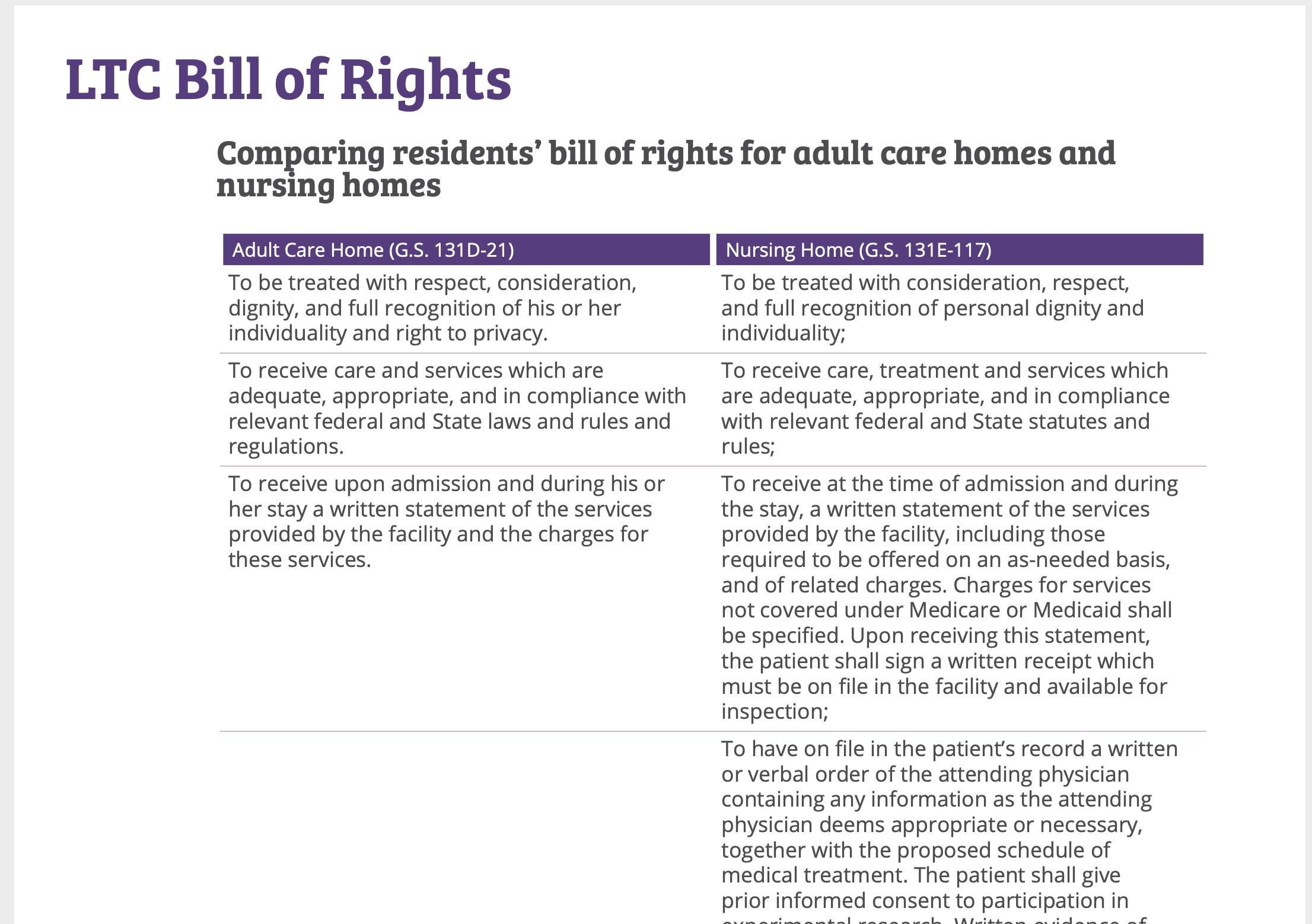
Crimes that May be Implicated in Elder Abuse Cases
A list of some of the crimes that may be charged in cases involving elder abuse, including statutory citations and a summary of the elements of the crime.
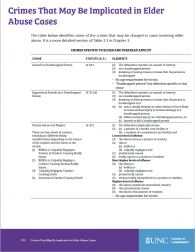
Which State Agency Should an Older Adult Call for Assistance?
A summary table that includes contact information for several key state agencies involved with elder abuse.
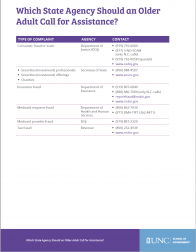
Flowcharts and Other Tools
Public Brochure
A brochure for clerks and other professionals to use to educate members of the public on identifying and responding to elder abuse. The brochure contains a fillable form into which users can insert local contact information. To print as a foldable brochure, choose the option to “print on both sides of paper” and to “flip on short edge” options from your printer’s settings.
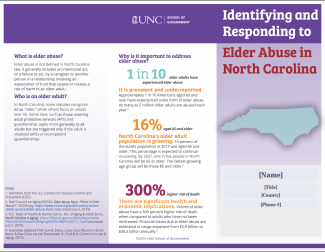
Power of Attorney Termination Flow Chart
A chart that provides guidance on terminating a power of attorney (POA) and obtaining information from an agent under a POA after the appointment of a guardian for an incompetent older adult.
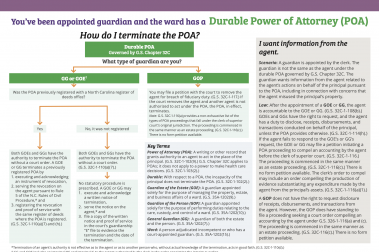
Bench Card: Preventing, Identifying, and Responding to Elder Abuse in Incompetency and Adult Guardianship Cases
This bench card is intended to help clerks of superior court prevent, identify, and respond to elder abuse in incompetency and adult guardianship cases where the clerk is the presiding judicial official.
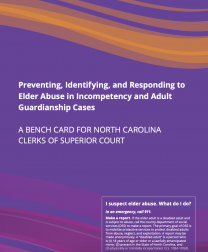
Roadmap to Elder Protection
This primer illustrates some of the connections and workflows that can exist in North Carolina’s elder protection system. This is not a comprehensive review of every possible action, option, or remedy available to help older adults who are victims of abuse, neglect, or exploitation. Rather, this primer is a summary-level snapshot that should be used in conjunction with the Legal Framework for North Carolina’s Elder Protection System (Legal Framework).
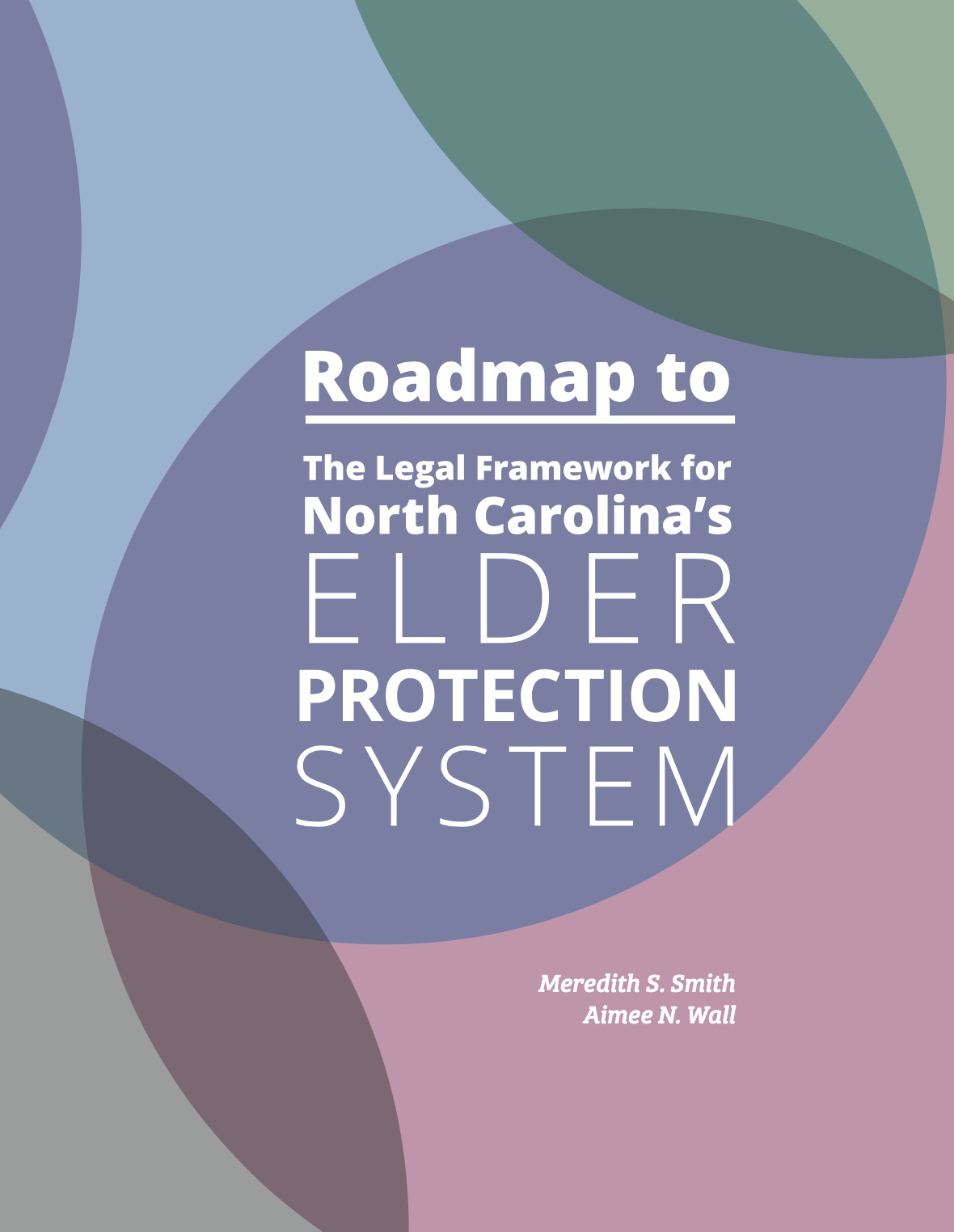
Techniques and Tips for Interviewing Older Adults
A summary of some techniques to consider when interviewing older adults in connection with elder abuse cases and links to additional resources.
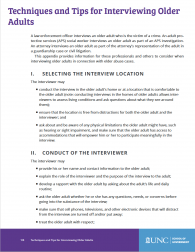
Resources for Guardians
Descriptions of several resources to help guardians better understand the responsibilities, importance, and scope of their role.
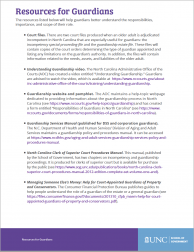
Adult Protective Services: Process Overview
A high level overview of the APS process, beginning with a report of abuse, neglect, or exploitation to the county social services agency.
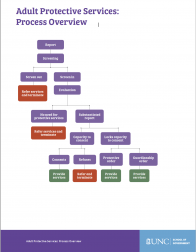
Guardianship: Overview of the Court Procedure to Appoint a Guardian for an Incompetent Adult
Overview of the Court Procedure for Appointing a Guardian for an Incompetent Person: A step-by-step review of the process that must be followed by the court when appointing a guardian for an incompetent person, beginning with the filing of a petition. Includes references to relevant AOC forms.
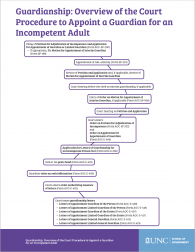
Resources for Older Adults Who Wish to Pursue Civil Remedies
Information to help guide older adults pursue civil remedies, including links and contact information.
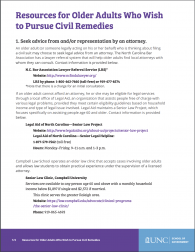
SOG Blogs
On the Civil Side
Relevant posts are included under the categories on the blog’s web page, such as posts on guardianship, powers of attorney, social services, and domestic violence. Please feel free to subscribe to this blog by clicking the "Read Now" button; on the blog there is a "Subscribe" box in the right hand sidebar.
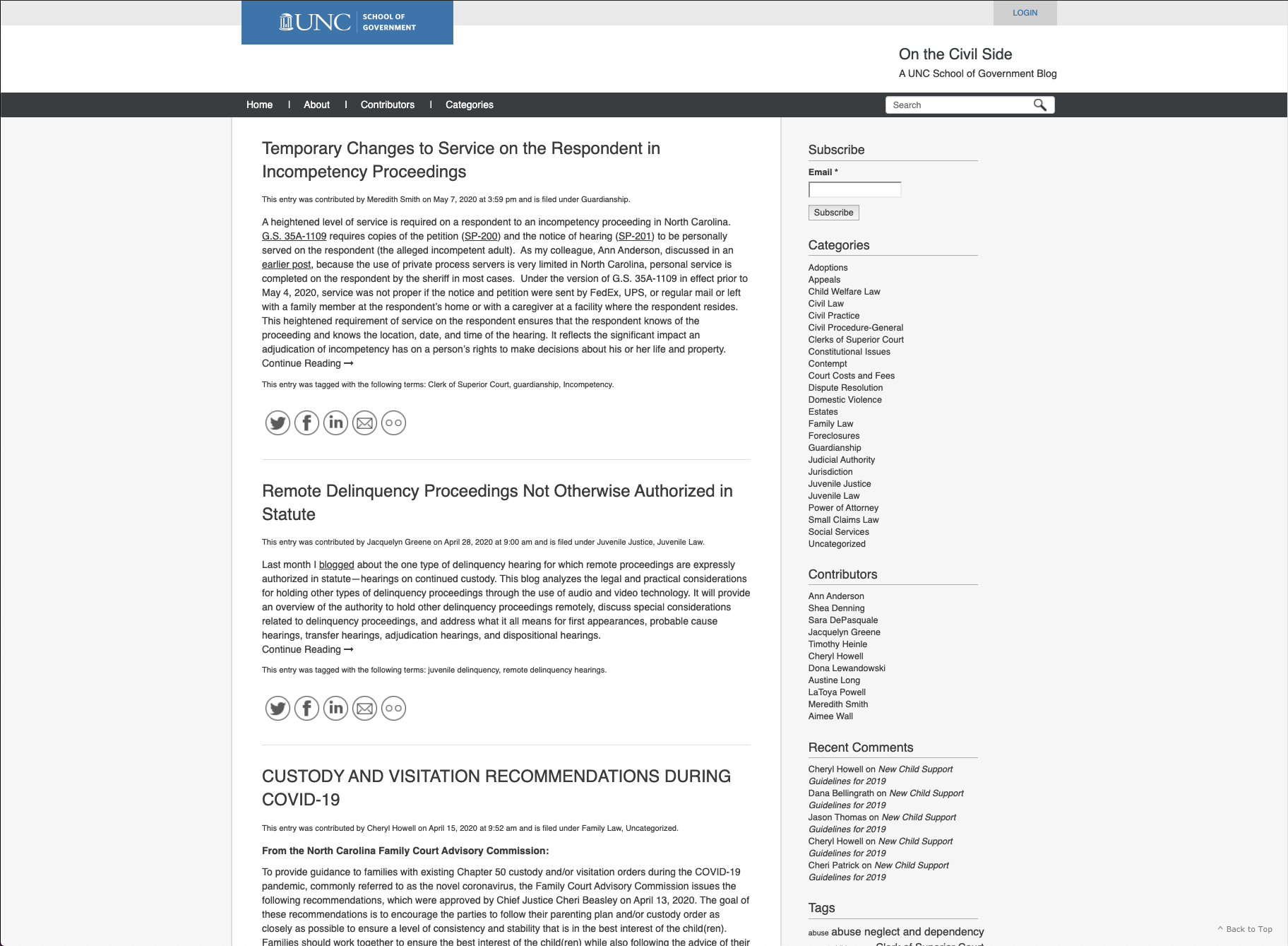
Coates’ Canons
Relevant posts will likely be included under the social services category on this blog’s web page. Please feel free to subscribe to this blog by clicking the "Read Now" button; on the blog there is a "Subscribe" box at the top of the right hand sidebar.
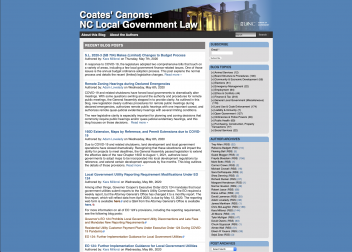
North Carolina Criminal Law
Searching with keywords such as "financial exploitation" and "assault" can be helpful in identifying relevant posts. Please feel free to subscribe to this blog by clicking the "Read Now" button; on the blog there is a "Subscribe" box in the right hand sidebar under the search box.
